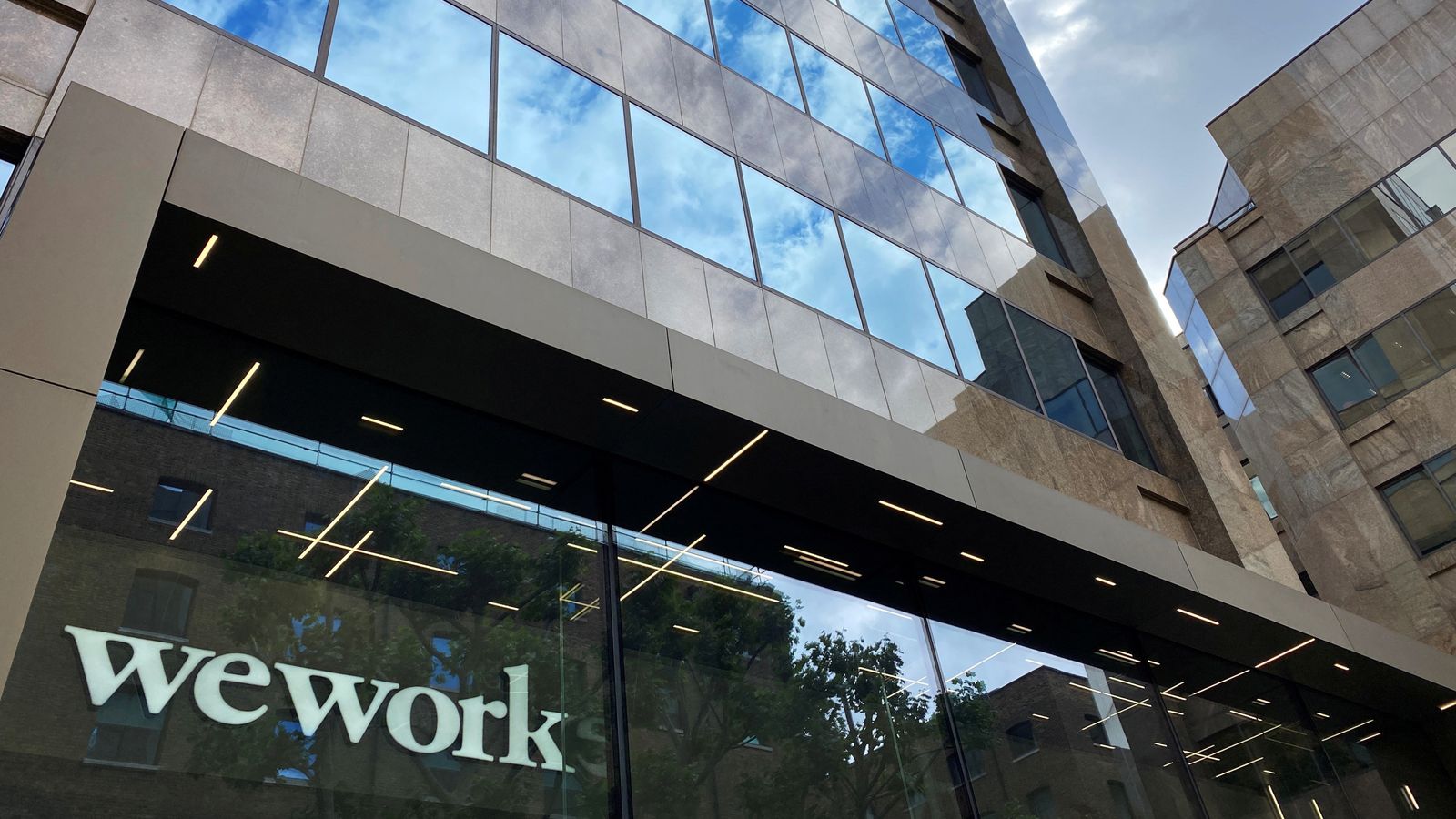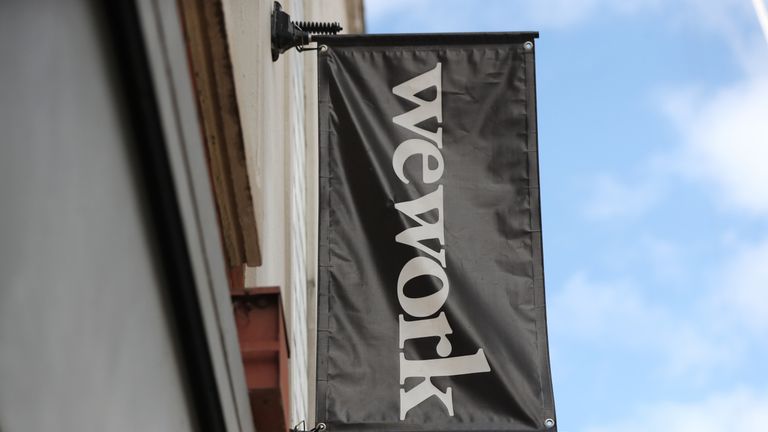It looks as if the end is nigh for WeWork, the flexible workspace provider that once commanded a valuation of $47bn.
The Wall Street Journal is reporting that the company plans to file for bankruptcy protection as early as next week.
It will be an ignominious end for a once-vaunted business seen as synonymous, in better days, with some of America’s hottest tech companies and the venture capital boom of the late 2010s.
The Journal reported that WeWork missed interest payments owed to its bondholders on 2 October – kicking off a 30-day grace period in which it needs to make the payments or be considered to have defaulted.
WeWork, whose stock market valuation has shrivelled to a mere £121m, said on Tuesday that it has reached an agreement with its bondholders giving it another seven days to negotiate before a default is triggered.
Luxurious lounges and free coffee and beer on tap
It is all a far cry from the days when, in 2019, WeWork was being feted as one of the hottest start-ups around.
The business was founded in New York in 2010 by Adam Neumann, an Israeli entrepreneur, who had tapped into a post financial crisis zeitgeist of more collaborative working.
He summed this up in a 2011 interview with the New York Daily News in which he said: “The 1990s and early 2000s were the ‘I’ decade. iPhone, the iPod – everything was about me. Look where that got us? In a terrible recession.
“The next decade is the ‘We’ decade, where collaboration is the future of innovation.”
“This generation watched big companies crumble. They have seen regimes overthrown by Facebook pages. If you look closely, we’re already in a revolution. We want to make it positive.”
To that end, WeWork targeted young workers, particularly in the tech sector, kitting out its light, airy, serviced workspaces with luxurious lounges and free coffee and beer on tap.
It was all about offering people the chance to have fun while they worked, encapsulated in the corporate slogan: “Do What You Love”.
In the sometimes stuffy world of commercial property, WeWork was seen as an innovator, quickly attracting financial backing.
In a Series G funding round, in July 2017, it was valued at $20bn.
By then, Mr Neumann was shrewdly selling shares in the business, recycling the proceeds into residential property.
As early as 2014, he had bought a $10.5m townhouse in New York’s Greenwich Village, following that in 2016 with the $16m purchase of a 60-acre farm estate in Westchester in upstate New York.
The company reached its zenith when, in January 2019, the Japanese tech investor SoftBank invested $2bn at a price valuing WeWork at $47bn.
Later that year, it filed for a stock market flotation.
When the penny began to drop…
By September 2019, scepticism towards the company was starting to mount.
The penny was beginning to drop on Wall Street that WeWork, despite the showy façade, was not a tech company but a conventional real estate business.
Worse still, it was a company that was entering long term leases, typically of a 15 year duration, while letting space out on a short term basis, typically of two years or less.
This was seen as potentially problematic in the event of a downturn in demand for office space and particularly in view of the sums WeWork was spending on refitting its offices.
Adam Neumann’s exit
There were also corporate governance concerns, particularly when it emerged that Mr Neumann had been letting properties he owned personally to WeWork.
By the end of the month, the IPO had been scrapped while Mr Neumann was ousted as chief executive, his exit smoothed by a $1.7bn pay-off.
By November 2019, SoftBank was apologising for the losses it had incurred by investing in WeWork, while still bailing out the company with a further $10bn that gave SoftBank 80% of the business.
Masayoshi Son, SoftBank’s founder, was still confident at the time that the investment would pay off.
Then came COVID-19
But then came COVID and a wave of lockdowns around the world. WeWork spent most of 2020 laying off employees, closing offices and renegotiating leases on the ones it kept.
This tidying-up exercise, aimed at stemming WeWork’s cash burn, was the precursor, finally, to the company’s stock market flotation.
Appropriately enough, this came via another investment craze, with WeWork merging with a Special Purpose Acquisition Company (SPAC).
These businesses, sometimes called ‘blank cheque’ companies, were essentially listed vehicles with no assets other than cash – specifically set up to merge with a private company looking to come to market without the hassle of embarking on lengthy investor roadshows and presentations.
WeWork came to market in October 2021 valued at $9bn, a fraction of the valuation it had previously commanded, which itself looked excessive in view of the fact that it had just reported losses of $3bn for the first half of 2021.
Ironically, one of the biggest winners from the listing was Mr Neumann, who had retained an 11% stake in the business. He reportedly celebrated WeWork’s stock market debut with a lavish tequila party.
Over the next few months hopes were raised that WeWork might benefit from the growing popularity, post-COVID, of hybrid working.
March 2022 saw the company forecasting that its revenues for the year would be at least 30% better than the outcome for 2021 and, that summer, the company reported that occupancy of its desks had returned to the pre-pandemic level of 72%.
But the company’s costs remained a nagging cause of concern and, when in November last year the company reported its third-quarter results, it was forced to admit that it would not be profitable during 2022.
It had burned through $205m in cash during the three months to September last year alone. The revelation was accompanied by news that another 40 underperforming offices in the US would be closed.
The irony of when WeWork’s time came
The huge irony in all this was that WeWork’s time seemed to have come.
Big companies, as hybrid working took off, were searching for exactly the kind of flexible workspaces it was offering.
Unfortunately, the company remained dragged down by onerous leases, with many of its sites based in some of the most expensive locations in the cities in which they were based.
Nor did sales rise in line with expectations. February this year saw the company report 2022 revenues of $3.245bn – a 26% increase on 2021 and short of previous forecasts – and an admission that it would only, at best, break even for 2023.
And now, interest rates were rising, putting further pressure on a business already groaning with debt.
Sandeep Mathrani stepped down as chief executive in May and, in August, his successor, David Tolley, was blaming a challenging economic backdrop and an oversupply of flexible working space as the company again missed its forecasts for the first half of the year.
He admitted there was “substantial doubt” over whether the company could continue trading. Subsequent months have seen a continued attempt to close unprofitable locations.
Shareholders have voted with their feet: the stock price is down 96% this year and a compulsory delisting, after the stock traded for more than 30 days at less than $1 – a breach of New York Stock Exchange rules – was only narrowly staved off by a one-for-40 share consolidation.
In the end, WeWork was never able to completely shake off its legacy, the debts it had incurred and the leases it had taken on.
The story of its failure – should it come to that – is proof of an old investment adage: if something looks too good to be true, it probably is.


